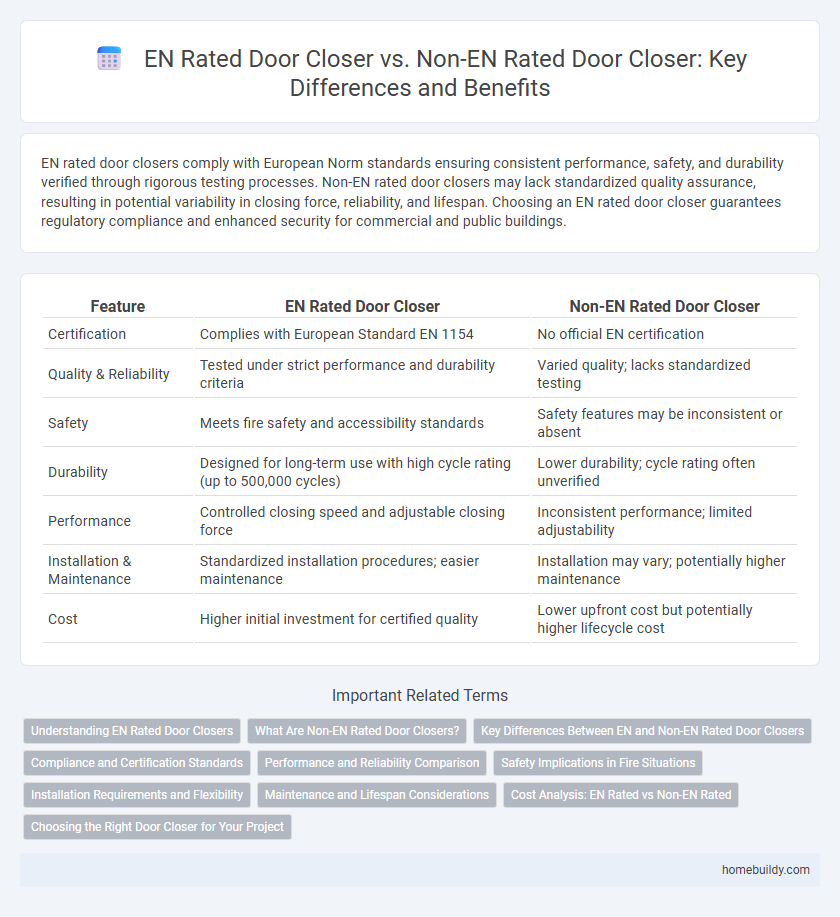EN rated door closers comply with European Norm standards ensuring consistent performance, safety, and durability verified through rigorous testing processes. Non-EN rated door closers may lack standardized quality assurance, resulting in potential variability in closing force, reliability, and lifespan. Choosing an EN rated door closer guarantees regulatory compliance and enhanced security for commercial and public buildings.
Table of Comparison
| Feature | EN Rated Door Closer | Non-EN Rated Door Closer |
|---|---|---|
| Certification | Complies with European Standard EN 1154 | No official EN certification |
| Quality & Reliability | Tested under strict performance and durability criteria | Varied quality; lacks standardized testing |
| Safety | Meets fire safety and accessibility standards | Safety features may be inconsistent or absent |
| Durability | Designed for long-term use with high cycle rating (up to 500,000 cycles) | Lower durability; cycle rating often unverified |
| Performance | Controlled closing speed and adjustable closing force | Inconsistent performance; limited adjustability |
| Installation & Maintenance | Standardized installation procedures; easier maintenance | Installation may vary; potentially higher maintenance |
| Cost | Higher initial investment for certified quality | Lower upfront cost but potentially higher lifecycle cost |
Understanding EN Rated Door Closers
EN rated door closers comply with strict European standards, ensuring consistent performance, durability, and safety across various applications. They undergo rigorous testing for controlled closing speed, latch speed, and resistance to wear, which non-EN rated door closers may lack. Using an EN rated door closer guarantees reliable operation, enhanced security, and compliance with building regulations, especially in commercial and public buildings.
What Are Non-EN Rated Door Closers?
Non-EN rated door closers are devices that do not meet the specific European Norm (EN) standards for performance, durability, and safety, often lacking precise testing and certification. These door closers may vary widely in quality, reliability, and compatibility with fire safety regulations, impacting building compliance and security. Unlike EN rated models like EN 1154, which ensure consistent closing force and durability, non-EN rated closers may fail to provide adequate control, increasing risks of door damage or security breaches.
Key Differences Between EN and Non-EN Rated Door Closers
EN rated door closers comply with European Norm EN 1154 standards, ensuring consistent performance, durability, and safety through rigorous testing for fire resistance and controlled closing speed. Non-EN rated door closers often lack standardized testing, which can result in variable quality, unreliable door closing, and potential safety risks, especially in emergency situations. The key differences lie in certification, performance reliability, and compliance with fire and safety regulations.
Compliance and Certification Standards
EN rated door closers comply with stringent European standards such as EN 1154, ensuring reliable performance, durability, and fire safety certification. Non-EN rated door closers often lack formal certification, leading to potential non-compliance with building regulations and fire safety codes. Certification standards guarantee EN rated devices meet rigorous testing for closing force, durability, and resistance to environmental factors, crucial for safety-critical installations.
Performance and Reliability Comparison
EN rated door closers undergo rigorous testing to meet stringent European safety and performance standards, ensuring consistent closing force, controlled speed, and enhanced durability. Non-EN rated door closers often lack standardized testing, resulting in variable performance and potentially reduced reliability under high-usage conditions. The EN rating guarantees compliance with fire and safety regulations, making these door closers a more reliable choice for commercial and public buildings requiring certified safety measures.
Safety Implications in Fire Situations
EN rated door closers comply with stringent European safety standards, ensuring reliable operation during fire emergencies by automatically closing doors to prevent fire and smoke spread. Non-EN rated door closers may lack consistent performance under heat and pressure, increasing the risk of fire and smoke migration. Proper certification like EN 1154 guarantees tested effectiveness, crucial for maintaining fire compartmentation and occupant safety.
Installation Requirements and Flexibility
EN rated door closers adhere to strict installation requirements ensuring consistent performance and compliance with European safety standards, while non-EN rated door closers offer more flexibility in installation but may lack standardized reliability. EN rated models require precise positioning, specific fixing methods, and often need certification to guarantee fire resistance and controlled closing speed. Non-EN rated closers provide easier installation options but may vary widely in durability, adjustability, and suitability for regulatory applications.
Maintenance and Lifespan Considerations
EN rated door closers undergo rigorous testing to meet standardized performance and durability criteria, resulting in longer lifespan and reduced maintenance needs. Non-EN rated door closers often lack consistent quality assurance, leading to more frequent repairs and shorter operational life. Proper maintenance of EN rated door closers involves scheduled inspections and adjustments, ensuring compliance with safety regulations and extending service intervals.
Cost Analysis: EN Rated vs Non-EN Rated
EN rated door closers typically have a higher upfront cost due to rigorous testing and certification standards, ensuring durability, safety, and compliance with fire and building regulations. Non-EN rated door closers may be cheaper initially but often entail higher long-term expenses related to maintenance, replacements, and potential non-compliance penalties. Investing in EN rated door closers minimizes risks and overall costs by providing reliable performance and adherence to legal requirements.
Choosing the Right Door Closer for Your Project
Choosing the right door closer for your project involves understanding the key differences between EN rated and non-EN rated door closers. EN rated door closers comply with strict European standards like EN 1154, ensuring reliable performance, controlled closing speed, and enhanced safety, making them ideal for commercial and public buildings. Non-EN rated door closers may lack certified durability and tested safety features, potentially compromising door functionality and user safety in critical applications.
EN rated door closer vs Non-EN rated door closer Infographic

 homebuildy.com
homebuildy.com